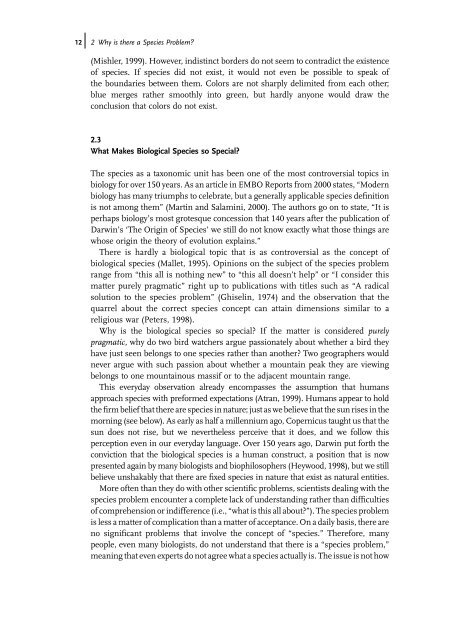Principios de Taxonomia
Create successful ePaper yourself
Turn your PDF publications into a flip-book with our unique Google optimized e-Paper software.
12j 2 Why is there a Species Problem?<br />
(Mishler, 1999). However, indistinct bor<strong>de</strong>rs do not seem to contradict the existence<br />
of species. If species did not exist, it would not even be possible to speak of<br />
the boundaries between them. Colors are not sharply <strong>de</strong>limited from each other;<br />
blue merges rather smoothly into green, but hardly anyone would draw the<br />
conclusion that colors do not exist.<br />
2.3<br />
What Makes Biological Species so Special?<br />
The species as a taxonomic unit has been one of the most controversial topics in<br />
biology for over 150 years. As an article in EMBO Reports from 2000 states, Mo<strong>de</strong>rn<br />
biology has many triumphs to celebrate, but a generally applicable species <strong>de</strong>finition<br />
is not among them (Martin and Salamini, 2000). The authors go on to state, It is<br />
perhaps biology s most grotesque concession that 140 years after the publication of<br />
Darwin s The Origin of Species we still do not know exactly what those things are<br />
whose origin the theory of evolution explains.<br />
There is hardly a biological topic that is as controversial as the concept of<br />
biological species (Mallet, 1995). Opinions on the subject of the species problem<br />
range from this all is nothing new to this all doesn t help or I consi<strong>de</strong>r this<br />
matter purely pragmatic right up to publications with titles such as A radical<br />
solution to the species problem (Ghiselin, 1974) and the observation that the<br />
quarrel about the correct species concept can attain dimensions similar to a<br />
religious war (Peters, 1998).<br />
Why is the biological species so special? If the matter is consi<strong>de</strong>red purely<br />
pragmatic, why do two bird watchers argue passionately about whether a bird they<br />
have just seen belongs to one species rather than another? Two geographers would<br />
never argue with such passion about whether a mountain peak they are viewing<br />
belongs to one mountainous massif or to the adjacent mountain range.<br />
This everyday observation already encompasses the assumption that humans<br />
approach species with preformed expectations (Atran, 1999). Humans appear to hold<br />
the firm belief that there are species in nature; just as we believe that the sun rises in the<br />
morning (see below). As early as half a millennium ago, Copernicus taught us that the<br />
sun does not rise, but we nevertheless perceive that it does, and we follow this<br />
perception even in our everyday language. Over 150 years ago, Darwin put forth the<br />
conviction that the biological species is a human construct, a position that is now<br />
presented again by many biologists and biophilosophers (Heywood, 1998), but we still<br />
believe unshakably that there are fixed species in nature that exist as natural entities.<br />
More often than they do with other scientific problems, scientists <strong>de</strong>aling with the<br />
species problem encounter a complete lack of un<strong>de</strong>rstanding rather than difficulties<br />
of comprehension or indifference (i.e., what is this all about? ). The species problem<br />
is less a matter of complication than a matter of acceptance. On a daily basis, there are<br />
no significant problems that involve the concept of species. Therefore, many<br />
people, even many biologists, do not un<strong>de</strong>rstand that there is a species problem,<br />
meaning that even experts do not agree what a species actually is. The issue is not how



